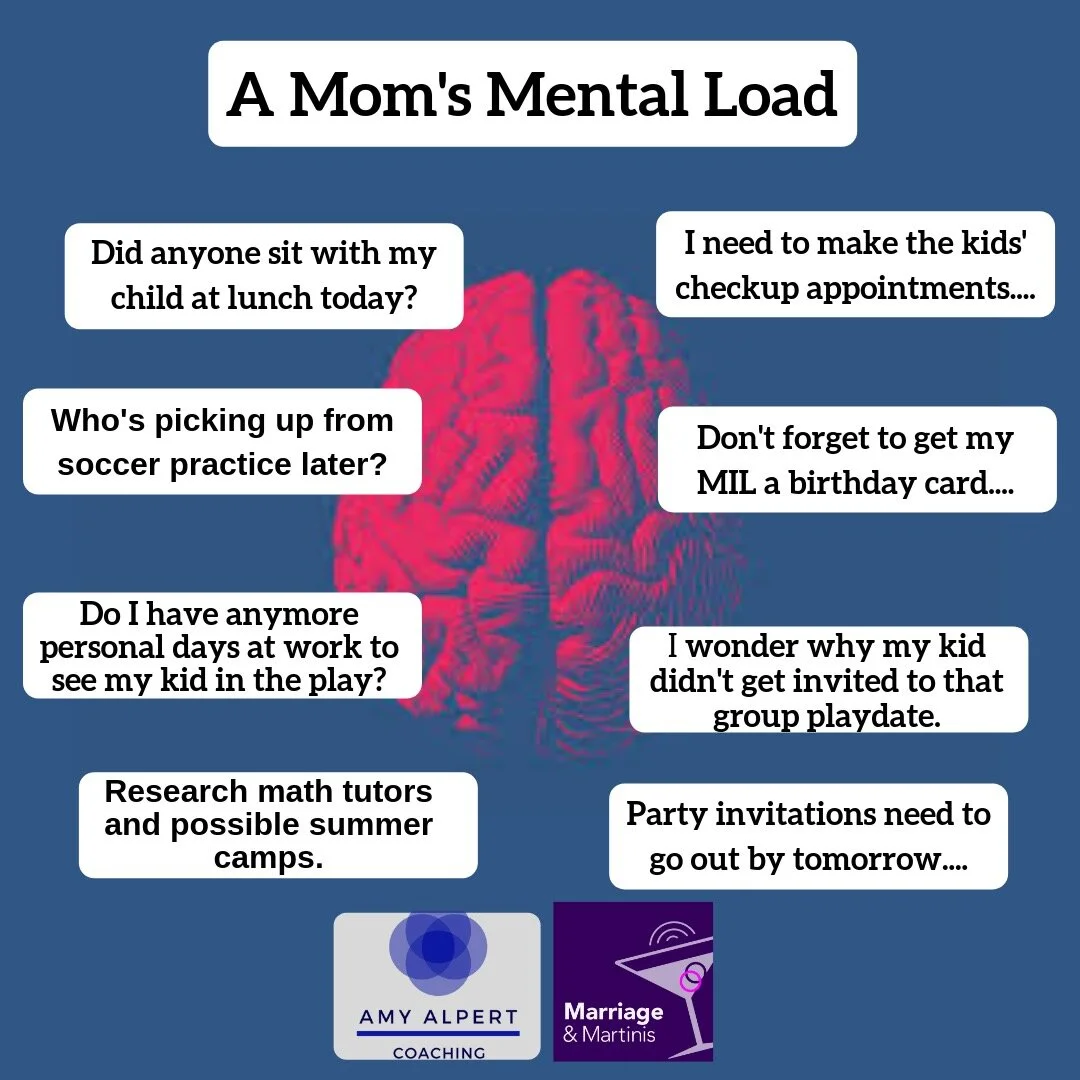Unpacking the Mental Load
I recently sent out an email to a working mother group I am a part of asking women to share their thoughts about Mental Load. My sister who runs the podcast Marriage and Martinis sent out a similar request to her 117,000 followers on Instagram. And wow, we hit a nerve!
Mental Load is defined as the invisible work that, in most cases, mothers have that is involved with running a family. It often includes the emotional caretaking, the day-to-day management of running a family and the burden of making sure nothing falls through the cracks. The women who responded were very emotional–and many were angry. This feeling of exhaustion and stress seems to be accepted as inevitable.
But now that we have a name for this phenomenon, perhaps we can tackle it.
So what contributes to mental load? It includes all the tasks that typically fall on the mother:
Researching tutors, camps, activities, schools
Scheduling playdates
Schlepping to extracurriculars
Dealing with all aspects of clothing: buying, laundering, switching over seasonally
Last minute shopping for unexpected school projects, bake sales, etc.
Making a house into a home
Constantly thinking about where kids are and who is taking care of them (and advance planning to ensure coverage)
FILLING out forms…. Endlessly
But mental load is more than a list of tasks. It is the oversight of these tasks, it is the emotional pressure of getting things right for our family. It is listening to your child who you love with your whole heart share a difficult experience and not falling down crying alongside them. It’s staying strong and helping find solutions while still empowering our kids. It’s worrying about our kids while they are sleeping, while they are at school, when they are traveling from place to place… just. constantly. worrying.
It is also a feeling of frustration that this load goes unnoticed and unappreciated. It is the feeling of exhaustion and overwhelm and our spouses not understanding why.
This is not necessarily any one person’s fault, it is societal and passed down from generation to generation. But just like the “Me Too” movement, if we give it a name, perhaps there can be movement towards a solution.
What is the solution?
I don’t have one solution, but I have some ideas to get us started. I hope to do a follow up blog with more suggestion based on the responses I receive here. Below is just a start…
Talk with your spouse about what Mental Load is. Listen together to my sister and brother-in-law’s podcast about Mental Load together if you need a jumping off point
Share your worries, your fears, those thoughts that you experience with your spouse. Perhaps the old adage ‘never worry alone’ could be appropriate here.
Invest time where it is appreciated. Don’t go the extra mile for an ungrateful person. Spend that energy and time elsewhere.
Find efficiencies. This can sometimes mean letting go of perfection. Learning from our spouse who may have a more efficient way to do things. Use technology. Delegate to others, including our children, as they get older.
Don’t enable. Let people learn how to do things themselves which may require letting go and letting them learn from their mistakes.
Take note of Home Control Disease (HCD) as defined by Tiffany Dufu in her amazing book Drop the Ball. Perfectionistic standards can result in your holding onto that responsibility for the rest of your life.
Think about your role modeling. Is this the life you want for you kids when they become parents?
See a marriage therapist if this is draining your relationship. The best time to see a therapist is when things aren’t dire.
Encourage your spouse to take parental leave so that you can figure out parenting together. The earlier the non-primary parent gets their hands dirty and you figure things out together the better.
If you have a leadership role in a company, create a generous parental leave policy and encourage employees to take it.
Figure out if there is any roles and responsibilities you can trade with your spouse to change things up. Think about a Halloween candy trade – “I’ll give you my snickers for your Reeses”–or “I will take out the trash if you do the late night party pick-ups”.
Don’t make assumptions about parental roles. Reach out to both parents when organizing carpools, responding to party RSVPs and participation in school activities.
Focus on what’s working. Are there ways you are dividing and conquering well? Why do you think that is working? First, give yourself credit for your successes! Second, see if there is anything you can draw from what is working to inform areas that need help.
Let’s start talking about mental load and how it affects us personally. Think about how we can engage our spouse and work towards creating a healthier distribution of labor as well as making an effort to make the invisible visible. Everyone’s marriage is different, so think about the particulars of your arrangements and how you can share the wealth with your spouse and work as a team. We owe it to ourselves, our partner and our kids.

